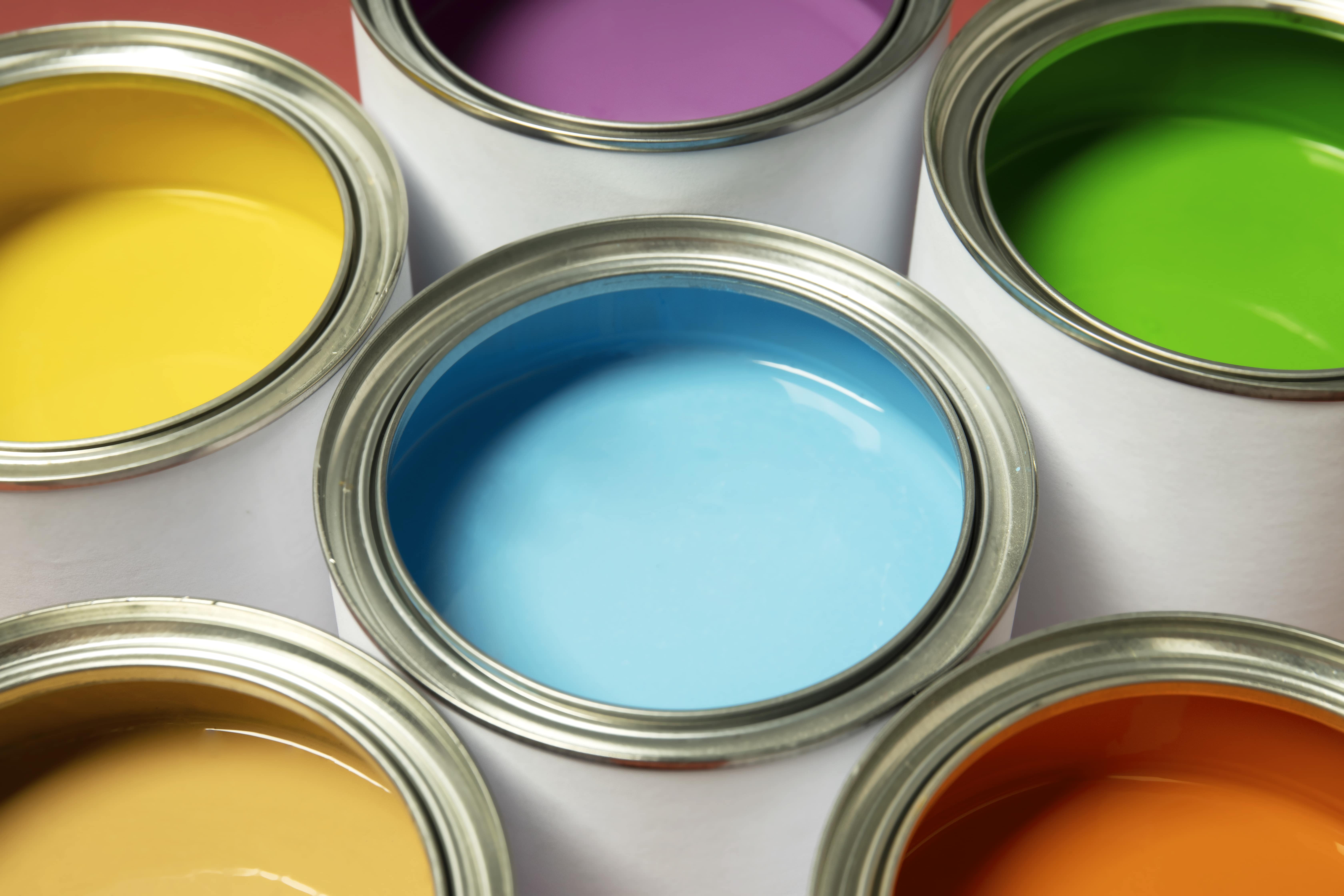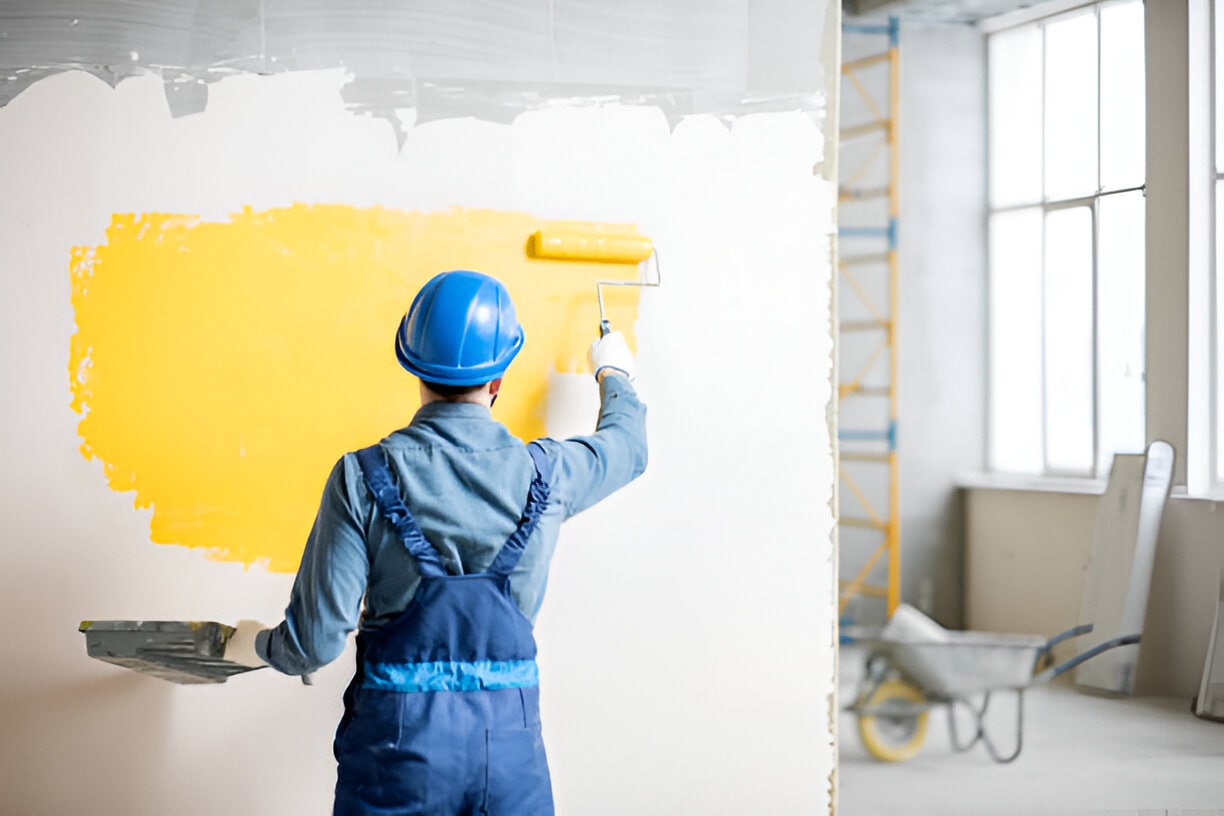
Emulsion paint has become popular for homeowners, and for good reason. Its ease of use, versatility and durable finish make it suitable for a wide range of projects. But what truly sets emulsion paint apart is its variety of finishes, allowing you to achieve virtually any desired aesthetic.
In this blog, we will learn more about emulsion paint, its types, and its advantages to help you make an informed decision about whether it’s the right choice for your home improvement projects.
What is Emulsion Paint?
Emulsion paint is a water-based paint made up of several components. These include pigments, solvents, binders, and additives that work together to provide a smooth finish, durability, and ease of application.
Here’s a breakdown of the components:
- 25% Pigment: Emulsion paint contains 25% pigments, including iron oxide for yellows, browns, and reds, titanium dioxide for white, carbon for black, and chromium oxide for green shades.
- 45% Solvent: The solvent in emulsion paint is primarily water, making up 45% of the formula and allowing for easy application and quick drying.
- 25% Binders: About 25% of emulsion paint comprises binders, typically acrylic or epoxy polymers, which help the paint adhere to the surface.
- 5% Other Additives: Emulsion paint also contains 5% additives, such as biocides, which prevent fungi and algae growth on the painted surface.
When applied, the tiny polymer particles within the paint are suspended in water. As the paint dries, the water evaporates, causing the polymer particles to fuse, creating a durable film of pigment and binder on the wall. This fusion makes the emulsion paint adhere firmly to surfaces; once dry, it cannot be easily removed by water.
Advantages of Using Emulsion Paint
Emulsion paint offers a range of benefits, making it a popular choice for residential and commercial painting projects. Below are some of its key advantages:
- Quick Drying Time: Emulsion paint dries within a few hours, allowing for faster project completion and minimal waiting time.
- Low Odour and Environmentally Friendly: It produces minimal fumes, making it ideal for indoor use, and its water-based composition is more environmentally friendly than oil-based paints.
- Easy Clean-Up: Its water-based nature allows for easy cleaning of brushes, rollers, and spills with soap and water.
- Durability and Maintenance: Emulsion paint is resistant to cracking, fading, and wear, ensuring long-lasting results with minimal maintenance.
- Application Versatility: Suitable for both interior and some exterior surfaces, offering flexibility for various painting needs.
Types of Emulsion Paint Finishes
Emulsion paint comes in a variety of finishes, each offering unique characteristics that cater to different aesthetic preferences and functional needs, as follows:
- Matte Finish: This finish is non-reflective and helps hide wall imperfections, making it ideal for living rooms, bedrooms, and low-traffic areas.
- Satin Finish: With a subtle sheen that adds depth and is more washable, satin finish is perfect for hallways and areas with moderate traffic.
- Silk Finish: Featuring a higher gloss level, silk finish is easy to clean and is best used in high-traffic areas like kitchens and children’s rooms.
- Eggshell Finish: Similar to satin but with a more delicate sheen, the eggshell finish is suitable for rooms needing elegance and some durability.
Common Uses of Emulsion Paint
As mentioned, emulsion paint is highly versatile and can be used in various settings, offering benefits such as easy application and durability. Here is how emulsion paint is commonly used:
- Interior Walls and Ceilings: Emulsion paint is ideal for interior walls and ceilings due to its smooth application, quick drying time, and wide range of finishes to suit any décor.
- Exterior Surfaces: Specialised emulsion paint formulations provide weather-resistant properties, making it suitable for use on exterior walls exposed to varying outdoor conditions.
- High-Humidity Areas: Emulsion paints with mould-resistant additives are perfect for bathrooms, kitchens, and other high-humidity areas, helping prevent mould and mildew growth while providing a long-lasting finish.
How to Choose the Right Emulsion Paint for Your Needs?
Choosing the right emulsion paint requires considering several factors to ensure it suits your specific requirements, as listed below:
- Factors to Consider: Consider the room type and its function, such as high-traffic or low-traffic areas, the desired finish and aesthetic and the level of exposure to moisture and sunlight.
- Special Additives: For areas prone to moisture, such as bathrooms or kitchens, choosing paints with mould-resistant additives or enhanced durability can help extend the life of your paint job.
- Budget Considerations: Balance cost with quality by selecting emulsion paints that offer durability and performance while staying within your budget, ensuring long-lasting results without compromising quality.
Application Tips for Homeowners
Proper application of emulsion paint is essential for achieving a professional finish and ensuring the paint lasts. Here are some helpful tips for a successful paint job:
- Preparing Your Surface: Clean the surface, repair imperfections, and prime the area if necessary to ensure better paint adhesion and a smooth finish.
- Applying Emulsion Paint: Use tools like rollers for large areas and brushes for edges or corners, applying the paint in even, smooth strokes to avoid streaks.
- Number of Coats: For optimal coverage and a uniform finish, applying two coats of paint is usually recommended, allowing each layer to dry before the next.
- Drying Time: Emulsion paint typically dries in a few hours, but you should wait at least 3 hours before applying the second coat. However, this duration may vary depending on the emulsion paint you use, the climate and the surface you are painting.
- Ventilation: Ensure good ventilation by opening windows or using fans, which helps speed up drying and reduces lingering paint odours.
Frequently Asked Questions About Emulsion Paints
What is the difference between emulsion paint and oil-based paint?
Emulsion paint is water-based, dries faster, has low odour, and is easier to clean with water. In contrast, oil-based paint is solvent-based, takes longer to dry, has a strong odour, and requires solvent for clean-up. Emulsion paint is more environmentally friendly than oil-based paint as the latter contains more volatile organic compounds (VOCs) than water-based paint, which can contribute to air pollution and respiratory issues.
Can emulsion paint be used on surfaces other than walls?
Yes, emulsion paint can be used on surfaces other than walls. Interior emulsion paint is suitable for ceilings and furniture, while exterior emulsion paint can be applied to outdoor surfaces like doors and fences. Both types offer different finishes, such as gloss, matte, and eggshell, for various needs.
How long does emulsion paint last?
Emulsion paint typically lasts 5 to 10 years for interior walls, depending on factors like room usage, moisture levels, and paint quality. High-traffic areas may require touch-ups more frequently, while well-maintained, low-traffic rooms can retain their finish for longer. For exterior walls, emulsion paint generally lasts 3 to 5 years due to exposure to the elements.
Is it safe to use emulsion paint in a home with children and pets?
Yes, emulsion paint is generally safe for homes with children and pets as it has minimal odour, dries quickly, and is water-based, making it a safer choice than oil-based paints. However, you must choose low-VOC or zero-VOC emulsion paint to be extra careful. Moreover, keeping children and pets outside during application is better for their safety.
What is the best way to maintain walls painted with emulsion?
To maintain walls painted with emulsion, you can dust and wipe them with a damp cloth to remove dirt. For stains, gently scrub with soapy water or a mild cleaning solution. Avoid abrasive cleaners and touch-up areas as needed to maintain the paint’s fresh appearance over time.
Choosing the Right Emulsion Paint for Your Home
Out of the different types of paints for homes, emulsion paint offers numerous benefits, including quick drying, easy clean-up, and durability. Its versatility allows it to be used on interior and exterior surfaces, with various finishes like matte, satin, and silk to suit different preferences.
When choosing the right type of emulsion paint, it’s essential to consider the specific room, moisture levels and desired aesthetic. Moreover, selecting the right finish and formulation is critical. Besides this, hiring professional painters in Singapore can make a significant difference in achieving a flawless finish, ensuring proper surface preparation, and extending the life of your paint job.
With the right choice of emulsion paint and expert application, you can transform your space beautifully and efficiently.

